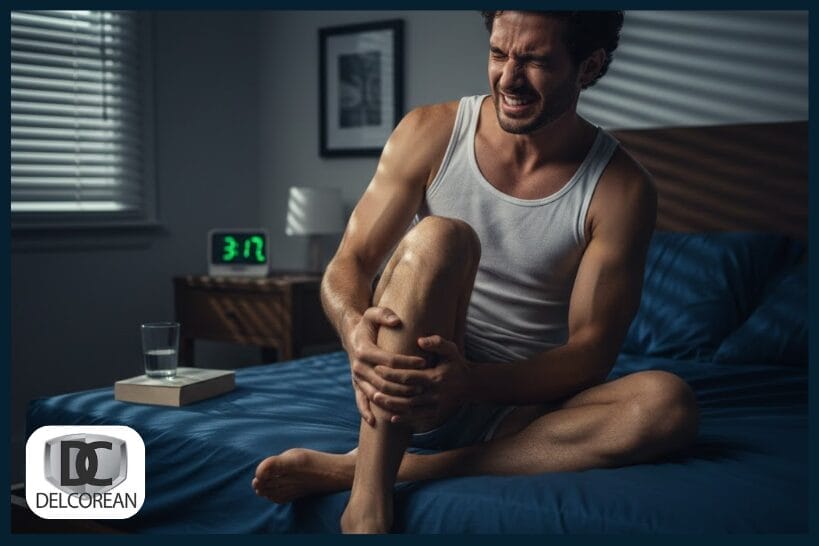Few experiences disrupt sleep as abruptly as the sudden onset of nocturnal leg cramps. These involuntary, painful muscle contractions typically strike without warning, often jolting individuals awake in the middle of the night with intense discomfort. Characterized by a sudden tightening sensation, most commonly in the calf muscles, nighttime leg cramps affect an estimated 60 percent of adults at some point during their lifetime, with prevalence increasing significantly after age 50.
While generally benign, leg cramps that occur during sleep can substantially impact quality of life, leading to sleep deprivation, daytime fatigue, and considerable distress. Understanding what causes leg cramps at night is essential for both prevention and effective management. By identifying the underlying factors that contribute to these painful episodes, individuals can take proactive steps to reduce their frequency and severity.

What Are Nocturnal Leg Cramps?
Nocturnal leg cramps are sudden, involuntary, and often painful muscle contractions in the legs that occur while resting or sleeping. These cramps, most common in the calves but also affecting the thighs or feet, last seconds to minutes. The intense contraction leaves muscles tight and shortened, and soreness can remain for hours.
Nocturnal leg cramps must be differentiated from restless legs syndrome (RLS). RLS is a separate neurological condition characterized by an uncomfortable urge to move the legs, relieved by movement, not painful involuntary contractions. Cramps, conversely, are acute spasms requiring stretching or massage.
Cramps occur more often at night because the feet often rest in a plantarflexed, or toes-down, position during sleep, shortening the calf muscles. Reduced movement during sleep may also decrease blood flow, increasing susceptibility to involuntary contractions.
Related Article: How to Treat Foot Cramps at Night
Primary Causes of Nighttime Leg Cramps
The etiology of nocturnal leg cramps is often multifactoral, with several contributing mechanisms that may act independently or in combination. While the precise pathology remains incompletely understood, research has identified a number of factors that increase the likelihood of experiencing these painful episodes.
Prolonged Sitting or Sedentary Behavior
Remaining seated for extended periods, such as at a desk job or during long flights, can lead to muscle shortening and reduced blood flow to the leg muscles. This circulatory stagnation deprives muscle tissue of adequate oxygen and nutrients, increasing susceptibility to cramping during sleep.
Muscle Fatigue from Overexertion
Engaging in strenuous physical activity, particularly when muscles are unconditioned, can result in muscle fatigue that manifests as nocturnal leg cramps hours later. The calf muscles are especially vulnerable following activities such as running, hiking, or prolonged walking.
Standing for Extended Periods on Hard Surfaces
Occupations requiring prolonged standing, especially on concrete floors, place sustained stress on the leg muscles. This continuous demand can lead to muscle exhaustion and metabolic waste accumulation, triggering painful contractions during rest.
Poor Posture During Daily Activities
Improper body mechanics throughout the day can place undue strain on specific muscle groups. Over time, these postural imbalances contribute to muscle tightness and dysfunction that increases cramp risk during periods of sleep.
Dehydration and Electrolyte Imbalances
Insufficient fluid intake or losses through sweating, illness, or medication use can deplete essential minerals critical for proper muscle function. Magnesium, potassium, and calcium deficiencies are particularly associated with increased muscle cramps.
Impaired Blood Flow and Circulatory Conditions
Peripheral artery disease, venous insufficiency, and other vascular conditions can compromise blood flow to the extremities. When the leg muscles receive inadequate oxygen and nutrients, involuntary contractions become more likely during prolonged periods of immobility.
Nerve Damage from Underlying Medical Conditions
Peripheral neuropathy—commonly associated with diabetes, chemotherapy, or autoimmune disorders—can disrupt normal neuromuscular signaling. This nerve damage interferes with the body’s ability to regulate muscle contractions, leading to spontaneous cramping episodes.
Medication Side Effects
Certain medications, including diuretics, statins, and some blood pressure medications, may alter electrolyte balance or directly affect muscle tissue. Patients taking these medications should discuss their cramp symptoms with a healthcare provider to evaluate potential contributing factors.
Risk Factors That Increase Susceptibility
Certain populations demonstrate heightened vulnerability to nighttime leg cramps based on demographic, lifestyle, and medical characteristics. Recognizing these risk factors can help individuals and healthcare providers identify those who may benefit most from preventive interventions.
Advanced Age
Adults over 50 experience nocturnal leg cramps at substantially higher rates than younger populations. This increased prevalence may relate to age-associated muscle mass loss, reduced blood flow efficiency, and higher rates of chronic medical conditions that affect neuromuscular function.

Pregnancy
Pregnant individuals face significantly elevated risk of leg cramps, particularly during the second and third trimesters. Hormonal changes, increased circulatory demands, and shifts in electrolyte balance all contribute to this heightened susceptibility. Additionally, the growing uterus may compress blood vessels, further reducing blood flow to the lower extremities.
Chronic Medical Conditions
Individuals with diabetes, kidney disease, thyroid disorders, or liver cirrhosis experience muscle cramps at higher rates than the general population. These conditions can affect electrolyte regulation, nerve damage progression, and overall metabolic function.
Medication Use
Patients taking medications that affect blood pressure regulation, fluid balance, or cholesterol metabolism should be aware of their elevated cramp risk. Diuretics, statins, and certain antihypertensive agents have been associated with increased nocturnal leg cramps.
Occupational Demands
Professions requiring extended standing or prolonged sitting place sustained demands on the leg muscles. Healthcare workers, retail employees, and desk-based professionals all demonstrate increased susceptibility to nighttime cramping episodes.
Athletic Training
Athletes and individuals who engage in intense physical exercise may develop muscle fatigue and electrolyte depletion. Without adequate recovery, hydration, and mineral replenishment, the calf muscles and other leg muscles remain vulnerable to nocturnal cramping.
How Cramp911 Can Help Relieve Your Leg Cramps
For individuals seeking fast, effective relief from nocturnal leg cramps, Cramp911 offers a topical solution designed to address muscle cramps at the source. Developed with FDA-approved homeopathic ingredients, specifically magnesium and copper, this innovative formula provides targeted relief without the drawbacks associated with oral medications.
What sets Cramp911 apart is its rapid onset of action, with relief beginning in as little as 15 seconds after application. Patients have also reported up to 8 hours of muscle pain relief, making it an excellent preventative option when applied at bedtime. The easy-to-use roll-on applicator delivers active ingredients directly to the affected calf muscles and leg muscles, and because it does not interact with other medications, it represents a safe option for individuals managing multiple health conditions.
Related Article: 8 Natural Remedies for Leg Cramps

Sleep Soundly Without the Pain
Nocturnal leg cramps arise from a complex interplay of factors, including muscle fatigue, reduced blood flow, electrolyte imbalance, and underlying medical conditions. While these episodes are common, particularly among older adults and pregnant individuals, understanding their causes empowers individuals to take preventive action.
By maintaining adequate hydration, stretching regularly, and addressing contributing lifestyle factors, many people can reduce the frequency of nighttime leg cramps. For those seeking immediate, reliable relief, Cramp911 offers a fast-acting, long-lasting topical solution that can help you reclaim restful, uninterrupted sleep.


